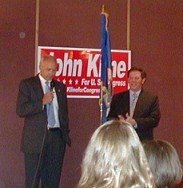This is the third in a series of posts discussing what John Kline evidently believes is the most important domestic issue facing us today:
Terrorists in America!! We previously discussed how Kline's focus on the issue
contradicts the Flypaper Theory justification for the war in Iraq, and how
few of the seven recent examples he cites of terrorist activity in America amount to much.
But some of these recent examples deserve closer inspection, like the case of
Michael Curtis Reynolds of Wilkes-Barre, PA, Pocatello, ID and a quite a few other addresses.
It seems that Mr. Reynolds had a protracted online discussion with someone whom he believed to be a member of al Qaeda, and in the course of this discussion, formulated a plot to disrupt the U.S. economy by blowing up some oil refineries and large sections of the Alaskan pipeline. According to federal prosecutor John Gurganus, his motives were
. . . to "disrupt government function," provoke opposition to the war in Iraq, drive up fuel prices and "lend to the efforts by al-Qaeda to terrorize this nation."
Fortunately, Mr. Reynolds wasn't really communicating with members of al Qaeda at all, but rather with a Montana judge named Shannen Rossmiller, who has been surfing the net since the 9/11 attacks, searching for possible al Qaeda recruits and reporting them to authorities.
So no one in this story really had anything to do with al Qaeda. And although Mr. Reynolds talks the talk, the
more you
learn about him, the clearer it is that he has no political agenda or ideology, and is likely a garden variety crook who will say or do anything for his own personal profit --- including the $40,000 that "al Qaeda" was going to give him to carry out his attack.
The most striking thing you learn is that Reynolds evidently tried to murder his parents in 1978 by blowing up the house while they were sleeping in it. His father talked authorities down to charging him with attempted arson. Reynolds was married in 1982, against the wishes of his father-in-law, Richard Danise, an ex-Marine who apparently did not appreciate Reynolds "blood and guts" bravado. Although Danise tried to help Reynolds and his daughter financially, Reynolds was unable to carry through on his plans to build a castle (yes, a literal castle), and the two eventually divorced.
We lose track of Mr. Reynolds until July 2004, when he surfaced in Wilkes-Barre, living in a small house with his mother, who had lost a leg to diabetes. Apparently Reynolds then spent many hours doing some kind of unspecified electrical work in his van, which on one occasion he crashed into a neighbor's parked car. When the neighbor inquired about Reynolds taking responsibility for repairs, Reynolds "flipped out" and the police had to be called in.
In his lifetime, Reynolds has been charged with disorderly conduct, resisting arrest and breach of the peace, in addition to his attempted arson conviction in his youth. Reynolds is currently being held not on charges of terrorism, but for unlawful possession of a hand grenade.
Two things here are clear. Mr. Reynolds has no ideological or operational associations with al Qaeda, but was almost certainly willing to agree to anything to get his hands on some money (he reportedly had a net worth of $24.85 the day he was arrested). The other is, he almost certainly would not have followed through on any plan to blow up pipelines or refineries even if he
were dealing with al Qaeda. His effort to kill his parents failed because he flooded the lower part of the house with propane, but set an igniter on the upper floors (propane gas does not rise). He didn't follow through on plans to build a castle. He couldn't drive his van without hitting a parked car, and he had just been fired from his job before he was arrested. Finally, there are suggestions (though I can't find a working link to them) that one of the oil refineries he meant to target no longer exists.
Don't get me wrong --- it's pretty clear Reynolds is a psychopath, and America is a safer place with him locked up. But is this really a case of Terrorists in America!!? Pretty clearly not.
And note one final detail: terrorist or not, Reynolds was arrested using an old-fashioned sting operation. No Patriot Act provisions or illegal warrantless surveillance required.

